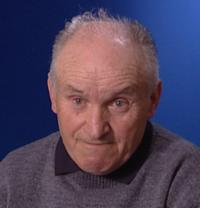Greatness of a man doesn’t lie in where he was, what he saw or how many universities he finished; it lies solely in his deeds
Alojz Kuna was born in 1936 in the village of Výčapy - Opatovce in the peasant family. From his early childhood his parents raised him in love with their land and prepared him to take over his father‘s homestead. František Kuna was labelled as kulak and a class enemy of the building of socialist agricultural system. Despite the fact that Alojz longed for higher education, he was convinced that he must help his father, so in 1952 he enrolled at the secondary school of mining in Nováky. In the same year his father František was arrested and sentenced to two years of imprisonment; imposed a three hundred thousand crown fine and they also forced him to move out of Nitra region. He served his sentence in Jáchymov mines until after the death of President Klement Gottwald in 1953, he was granted amnesty and released from the prison. In the year 1957 Alojz Kuna enlisted in the military service in Opava, where he worked in a mine and later in a stone pit. When he had finished compulsory military service, he didn‘t want to continue working in the mine and thus he started to work in Hydrostav in Bratislava. His friends helped him to get this job and he kept working there as a manual worker for 32 years. He got married and brought up two sons.

